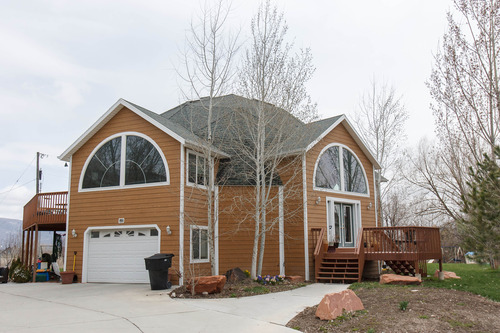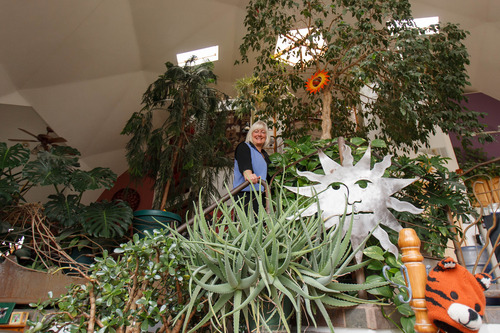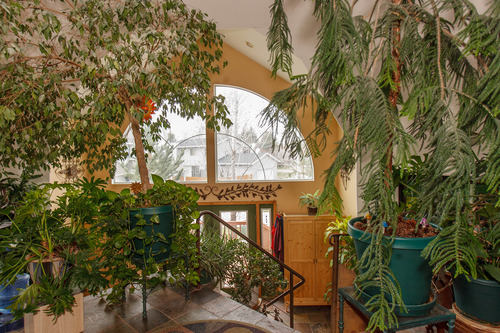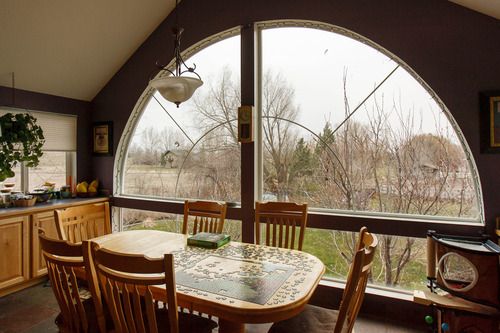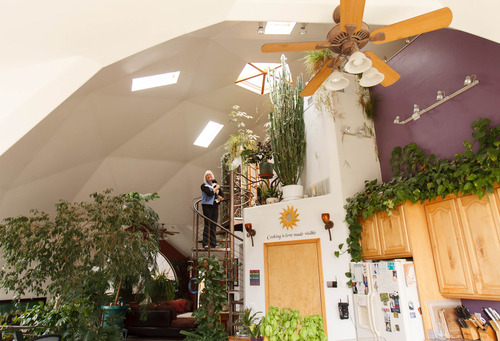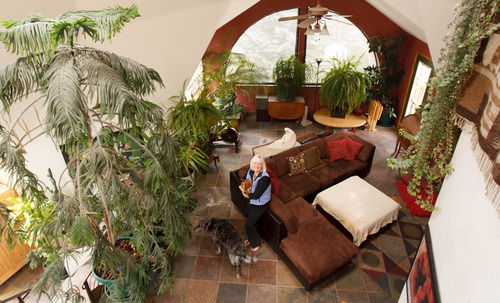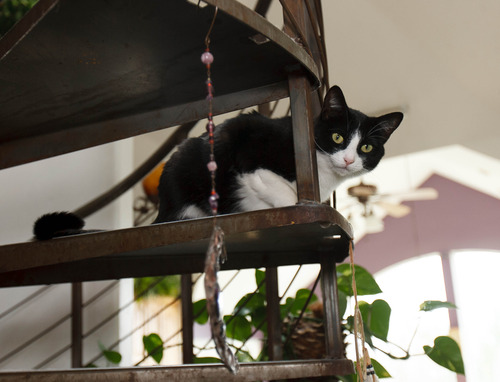This is an archived article that was published on sltrib.com in 2013, and information in the article may be outdated. It is provided only for personal research purposes and may not be reprinted.
Rob Gillies and his team gather data on Nepal's changing climate for a research project. They log temperatures, raindrops and snow. They pump the numbers into powerful computers and read the trend lines the computers spit out.
Gillies sees the numbers in human terms, too. Global warming is likely to mean less water, putting crops and livestock in peril, along with nourishment for children who already don't get enough to eat. That leaves the climate scientist with questions instruments can't answer. About fairness. Justice. And life and death.
"I see it as a scientific issue," said Gillies, Utah's state climatologist. "But, given my experiences in Nepal and elsewhere in the world, I see a moral aspect to it beyond science."
He is not alone in expanding the conversation about climate change beyond politics and science on the eve of the 44th Earth Day.
More and more people view it as a moral issue that touches on what people care about most: our relationships to one another, near and far; our relationship to the Earth or, for some, God's creation; our concern for the future; and our sense of what's right and good.
—
The voice of religion • "If we profess a love for God, for each other, our neighbors as ourselves, shouldn't we be protecting what God loves, which is the creation?" asked Sally Grover Bingham, an Episcopal priest and founder of the Interfaith Power & Light project.
Speaking recently at the University of Utah law school's Stegner Symposium, Bingham described global warming as the most pressing moral issue of our times.
It's a problem for people of faith in the developed world when they recognize their own oversized appetite for fossil fuels, while their pollution poses the greatest threat to people in the undeveloped world. And, while the world's wealthiest people are measuring the consequences of global warming in economic terms, the world's poorest will be paying with their lives.
"Major social changes in America have not happened without the voice of religion," Bingham noted, "and that voice is needed now."
Bingham's organization penned the Interfaith Declaration on Climate Change in 2009. Gathered with climate-change position statements of dozens of other religious groups on a web page hosted by The Yale Forum on Religion and Ecology, the interfaith declaration echoes the sentiments of churches, synagogues, mosques and temples around the world about the fundamental importance of being good stewards of God's creation, Bingham pointed out.
In the U.S., about 80 percent of Americans say they belong to a faith community, and that puts them in a powerful position to take meaningful action and to drive change — past the politics and the science skeptics.
"It's time to look for solutions," Bingham said, "to save the entire community of life — not one species, not one disease or one problem. This is about the well-being of the entire communion of life."
—
A moral issue • This notion that climate change has moral dimensions certainly isn't new.
In the world of science, physicist James Hansen, for one, has described climate change as a matter of intergenerational justice, a moral issue akin to slavery. In the world of environmental activists, author and activist Bill McKibben has used similar terms.
Susan Solomon, a climate scientist at the Massachusetts Institute of Technology, has noted that extinctions of plants and animals are accelerating and food crops are at risk because of the excess carbon pollution being pumped into the atmosphere. She noted that each American emits the carbon-pollution equivalent of an Ethiopian village of 150.
"We need to have an honest discussion of the ethics of that situation," she told reporters recently.
Locally, Utah's iMatter group of students and adult supporters have petitioned state-government agencies to start making decisions that account for climate change so they can hope for a livable future. And the multidenominational Utah Interfaith Power & Light has worked on forging common ground in the faith communities to promote climate action and a shift to clean energy. One of 40 state chapters nationwide, the Utah group has helped poor congregations raise money to go solar, noted Executive Director Susan Soleil.
Born and reared in the LDS tradition, she's convinced faith communities coming together can accomplish so much more than individual efforts to live green, like her own.
"We're commanded to love and care for those in need, but we're not doing that well enough," said Soleil, who describes her job as "a calling." "It feels like the conversation is being elevated by communities of faith."
For Stephen Trimble, "the Jewish guy" on Utah Interfaith Power & Light's board, the polarizing political fight has stymied meaningful action even though the scientific and moral issues are clear. He agrees with Bingham that the moral component can push the issue beyond the political debates.
"The health and the future of our planet is in our hands," said Trimble, a Salt Lake City author and photographer.
While he doubts he can sway the state's elected leaders about the urgency of taking on climate change, he said keeping the focus closer to home, on things he and his neighbors care about, holds more promise. He said, "I may be able to convince my neighbors that these things are important."
—
Stewardship imperative • Barry Bickmore, a Brigham Young University geology professor who blogs about the intersection of politics and climate change, pointed out the morality question cuts both ways on climate.
"Everybody," he said, "sees it as a moral issue." But sometimes from different points of view.
He's referring to some climate skeptics who insist not only that the science doesn't support changing the way we do things to reverse the course of global warming, but also that it would be immoral to switch to more expensive renewable-energy sources because the poor would suffer the most.
Bickmore also points out that many people of faith have a deep distrust of scientists and their theories. In the end, he said, people embrace the arguments most convenient to their way of life.
"There's all kinds of ways you can convince yourself to go around," he said, "and do what you wanted to do in the first place."
George Handley, chairman of the humanities department at BYU, noted that leaders of his faith, The Church of Jesus Christ of Latter-day Saints, don't declare policy positions on such issues as climate change. But he noted that the doctrines are clear that humans have a stewardship role to play.
And he says the church does put its principles into practice. He points to the high-efficiency, low-emission churches now being built as one example. In addition, church leadership allows members to speak their minds, which has led to a prominent and diverse group of environmental leaders in the local community, which includes Utah Physicians for a Healthy Environment founder Brian Moench, ethnographer Paul Cox, the LDS Earth Stewardship advocates and the 18 BYU scientists who implored state lawmakers to include mainstream climate scientists in their discussion on the issues instead of relying solely on operatives with fringe positions.
In addition, the Utah-based faith turned out the lights at Temple Square for Earth Hour a few years ago.
Handley notes that Mormons, like people of other religious persuasions, value the idea of passing on to their children and future generations a healthy world. To that end, he hopes that the notion of acting in a moral way on behalf of future generations can be a powerful motivator for action on climate change.
"You can't be ethical to this problem unless you think it's real, unless you care," he said. "I want [my children and grandchildren] to think of me as the kind of person who is kind and [who] worked in a way that had them in mind."
For Gillies, the state climatologist, there is a little more time to come up with suggestions for the Nepalese on how to adapt to climate changes on their horizon. His research grants for the project continue for a couple of more years.
Meanwhile, Katharine Hayhoe, a Texas climatologist who has been targeted by climate skeptics such as Rush Limbaugh, holds that there are some hopeful ways to respond to the moral challenge of global warming.
"Climate change is not very good news," says Hayhoe, an evangelical Christian who advocates for clean energy. "But, at the same time, I think it's good news to know that we have choices. By making wise and responsible choices now, we can ensure that we protect the things we care about the most on our planet for the benefit of the people we know and those who we don't."
Twitter: @judyfutah


